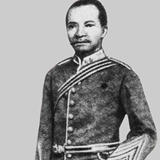
Africanus Horton
Political writer and army surgeon
Biography
James ‘Africanus’ Beale Horton (1835–1883) (Medicine, 1858) was a writer and a medical surgeon in the British Army.
Africanus was born James Horton in the village of Gloucester, just outside of Freetown, Sierra Leone. His parents were of Igbo ancestry and had come to Gloucester as recaptive slaves [slaves freed by the British Royal Navy, which intercepted illegal slaving ships leaving Africa].
Africanus went to a local school in Gloucester before being recruited by Reverend James Beale to the Church Missionary Society School in Freetown. In 1853 he started studying for the clergy at Fourah Bay Institution and two years later was selected for a British War Office scholarship to study medicine in the UK.
Africanus spent three years at King’s, graduating in 1858 and being made an Associate of the College at that time. He went on to complete an MD at Edinburgh. It was as a student that he took the name ‘Africanus’, reflecting his pride for his African heritage.
Following his studies, he was commissioned as a staff-assistant surgeon in West Africa, becoming one of the first Africans in the officer class of the British Army. He was posted to various places within the then British colony during his twenty-year army career.
Africanus made important contributions to the medicine and botany literature of West Africa, but he is best remembered for his political writing and his challenge of the prevalent racist views of the time. Books like The Political Economy of British West Africa (1865) and West African Countries and Peoples (1868) defended Africans against the idea that they were physically and intellectually inferior to white Europeans. He was also the first modern African political thinker to openly campaign for self-government for the West African colonies.
Following his retirement from the army at the age of 45, Africanus returned to Freetown where he continued to campaign on political issues. He also opened the Commercial Bank of West Africa. His business activities and gold mining investments made him one of the wealthiest men in Africa by 1880.
Did you know? There is a crater on Mercury named in Africanus Horton’s honour.
